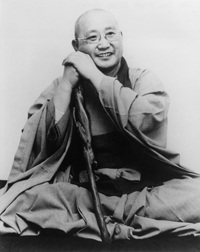Coming empty-handed, going empty-handed—that is human. When you are born, where do you come from? When you die, where do you go? Life is like a floating cloud which appears. Death is like a floating cloud which disappears. The floating cloud itself originally does not exist. Life and death, coming and going, are also like that. But there is one thing which always remains clear. It is pure and clear, not depending on life and death.

Then what is the one pure and clear thing?
—From a favorite teaching verse of Zen Master Seung Sahn.
Zen Master Seung Sahn, the first teacher of Korean Zen in the United States and one of the most prominent and influential teachers in the West, died peacefully on November 30, 2004, at Hwa Gye Sah temple in Seoul, South Korea, surrounded by his students. He was seventy-seven.
A legendary figure in Korea, Seung Sahn received inka, or authentication of enlightenment and authority to teach, from three Zen masters while still in his early twenties. He served as abbott of various temples in Korea and Japan before moving to the United States in 1972. Having heard there was a great hunger among young Americans for the dharma, he arrived with little English and took employment at a laundromat in Providence, Rhode Island. “Within a very short time,” remembers Jane Dobisz, co-guiding teacher of the Cambridge Zen Center, “all these students were going to the laundromat to get his teachings. He lived his life from what he called ‘Don’t Know Mind,’ with the confidence that it would always work out—and it always did.”
Known for his dramatic teaching style and incisive insight, as well as for his compassion and boundless sense of humor, Master Seung Sahn went on to establish a hundred centers in thirty countries as branches of his Kwan Um school. His uniquely phrased directives for practice have entered the Western Zen vocabulary: “Don’t make anything,” “Try mind,” “Only don’t know.”
“It was the simplicity and clarity of his teachings and his fearlessness and enthusiasm that struck me,” says Mark Houghton, co-guiding teacher of the Cambridge Zen Center. “He really saw the whole world as one family. He had this quality, this dharma light, that made people love him and embrace the teachings. . .. He often used to say the practice is believing in yourself, trusting yourself. The beauty of his practice was that he was fully committed. He handed out techniques freely and enthusiastically, and as a result he had centers pop up like mushrooms all over the world.”
“He always taught his students to Not Know and just pay attention,” says Barbara (Bobby) Rhodes, Kwan Urn School Senior Teacher. “When you ask ‘what am I?’ year after year, you open up your intuitive self. You realize you don’t need to be like your teacher, or other people—you find out who you are. I still use that; I’ll use that all my life.”
The author of six books in English, including Dropping Ashes on the Buddha and The Whole World Is a Single Flower, Seung Sahn was greatly revered in his home country, where he received the title of “Great Master,” the highest honor conferred by the Chögye Order of Buddhism. His funeral and dramatic public cremation at Su Dok Sah temple, attended by thousands, was featured prominently in Korean national news media.
Although he had experienced poor health in recent years, “he never complained,” says Jane Dobisz. “Not once did anyone ever hear him say T m too tired, I don’t want to give this talk.’ He was always the teacher. He was always the Zen master. He always had this great bodhisattva heart.”
Bobby Rhodes tells a story from her early years of practice, when Seung Sahn’s students had expressed concern over his decision to leave his fledgling Providence Zen Center to teach for several weeks in California.
“I’m not gone,” he said. “One moment of clear mind, and I am with you.”
What we call “world” is only an opinion…. Take away your opinion, your condition, situation—then your mind is clear like space… clear like a mirror. A mirror reflects everything: The sky is blue, tree is green, sugar is sweet. Just be one with truth—that’s Zen style. If your mind is clear like space, then you see clearly, hear clearly, smell clearly—everything is clear. That is dharma. That is truth.
—Zen Master Seung Sahn